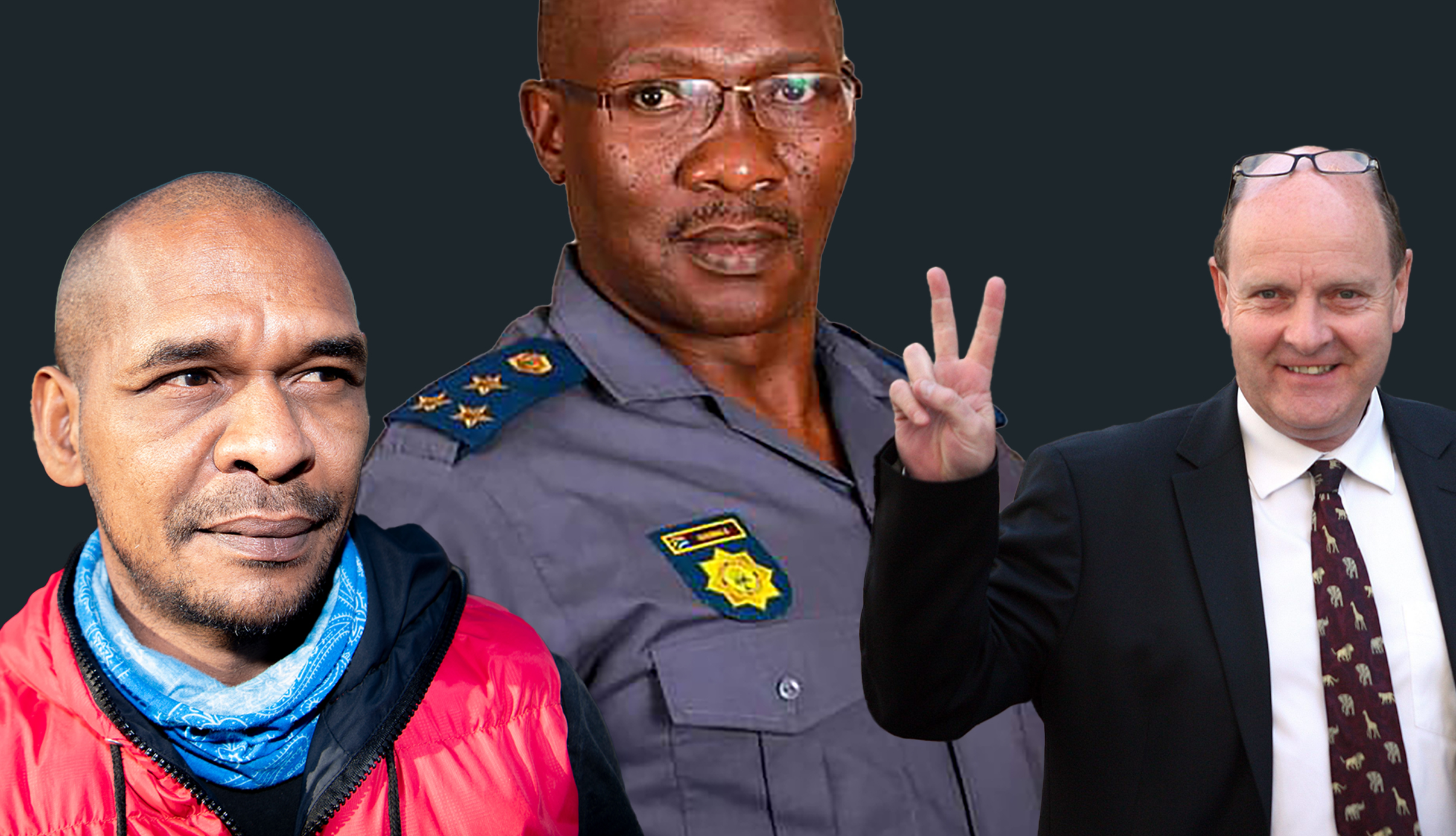Deep distrust and factionalism in the South African Police Service (SAPS) – this is what the recent arrest of national Crime Intelligence head Dumisani Khumalo underscores.
This inevitably spills over into politics.
The position of Crime Intelligence head in South Africa is critical and carries clout.
There may be attempts from certain quarters in the state to have a particular individual fill it or be blocked from it, depending on what one wants to access or achieve via the position.
In the case of Khumalo, he was appointed Crime Intelligence boss in December 2022 and arrested last Thursday, 26 June 2025.
He made his first court appearance, with six colleagues, on corruption charges the following day and plans to plead not guilty.
‘Pushback and resistance’
Before that, Khumalo’s time as Crime Intelligence boss was apparently rough.
A SAPS presentation to Parliament in March this year warned of attempts to tarnish him and the unit, especially via the media and social media.
“The SAPS-Crime Intelligence was weakened over years and allegations of unlawful activities [have] been reported,” it said.
“Attempts to revive the Division were made several times, but met with resistance because those that are unlawfully benefitting would obviously not support the changes.”
/file/dailymaverick/wp-content/uploads/2025/07/Presentation-to-Parliament-police-committee-in-March-2025-1.jpg)
/file/dailymaverick/wp-content/uploads/2025/07/Presentation-to-Parliament-police-committee-in-March-2025-2.jpg)
To try to improve the situation, plans were apparently implemented, including reviewing controls around informer rewards and taking state vehicles from senior managers and redistributing them at an operational level.
The presentation alleged: “These decisions were not supported by some in Senior Management level which made it difficult to implement and achieve the desired results. Misinformation through the media [is] used after each of these decisions [is] taken.”
Read more: Crime Intelligence target of social media fake news, but Parliament hears unit also like ‘a mafia’
The presentation added: “The Division has been experiencing a lot of misrepresentation of truth through social media platforms in respect of decisions and control measures put in place by the Management as the strategy of push-back by those that were and are still unlawfully benefiting”.
The presentation said that Khumalo “had to identify and recruit capable senior officers” via transfers and promotions to ensure new performance indicators were implemented.
“This resulted in the Divisional Commissioner to be wrongfully accused of bringing his ‘own people’.
“Some… social media postings talk to the misinformation and unfounded allegations that the Commissioner wrongfully appointed two Senior Managers within the Division of which it was found to be not true.”
An allegedly wrongful appointment is why Khumalo was arrested last week.
State Capture’s legacy
Issues along these lines are not unlike what emerged about State Capture when Jacob Zuma was South Africa’s president between 2009 and 2018.
The Commission of Inquiry into State Capture found that there had been “a deliberate effort to subvert and weaken law enforcement, [including] intelligence… to shield and sustain illicit activities, avoid accountability and to disempower opponents.”
It had also referred to irregular recruitments, discredited intelligence reports and Secret Service Account looting (suspicions about this still do the rounds).
What this ultimately means is that some high-ranking government officials played a role in intentionally derailing critical investigations leading back to the state, and that some honest investigators were portrayed as corrupt to tarnish the work they were doing.
Disinformation peddlers, smear campaign crafters, proxies acting on behalf of political puppet masters and rogue intelligence agents were put to work to ensure those destructive objectives were met.
Read more: Zuma’s legacy: The build-up to breaking down Crime Intelligence
Under Zuma’s administration, that was what happened, and Crime Intelligence was dirty.
Two months after Zuma was inaugurated in 2009, Richard Mdluli was appointed as the national head of Crime Intelligence.
Mdluli went on to be arrested and convicted of kidnapping and assault.
He is facing further charges linked to fraud and corruption, related to the looting of the secret service account. He has pleaded not guilty.
It would be naïve to think shady dealings simply ended when State Capture was exposed, or when Cyril Ramaphosa became President.
The country’s Crime Intelligence arena emphasises this – it is clearly still in the grip of controversy, infighting and accusations of criminality.
As things now stand, a former national Crime Intelligence boss (Mdluli) and its current head (Khumalo) actively face two different sets of criminal accusations in court.
But it is still early days in terms of Khumalo and his co-accused.
‘Flouted vetting process’
The six colleagues charged alongside him are: Crime Intelligence’s chief financial officer, Major General Philani Lushaba; the component head of intelligence, analysis and coordination, Major General Nosipho Precious Madondo; Gauteng’s Crime Intelligence boss, Major General Josias Lekalakala; technical management services officer, Major General Zwelithini Gabela; the section head of personnel vetting, Brigadier Phindile Ncube; and senior technical support services member Brigadier Dineo Mokwele.
The group faces accusations of fraud and corruption relating to Mokwele’s appointment.
(The March presentation to Parliament on Crime Intelligence, without naming Mokwele, provides a detailed breakdown of SAPS’s official version of her appointment and qualifications.)
According to the Independent Directorate Against Corruption (Idac), which carried out the officers’ arrests: “They are further accused of flouting the vetting process which is critical in the appointment of senior officials within the SAPS, particularly the Crime Intelligence division which deals with sensitive and confidential information.”
During the group’s court appearance last week, it emerged that they all denied the accusations against them and intended to plead not guilty.
The court heard that investigations in the matter had been finalised, however, other investigations involving some of those in the dock continued.
This suggests more arrests or criminal charges are possible.
Aside from Lushaba, who faces another legal matter, the accused were granted bail.
The case is expected to resume on 13 August.
It is yet to be seen whether Khumalo and his colleagues will simply argue that they have been incorrectly charged or whether they will claim there is a larger conspiracy against them.
If the latter, some of the lessons learnt from State Capture, when some decent individuals were portrayed as bad and vice versa, may be relevant.
The politician and the fraud examiner
The runup to Khumalo’s arrest last week had some political elements.
News24 reported: “There were multiple dockets opened linked to Mokwele’s appointment and other allegations of wrongdoing, including those opened by MP Fadiel Adams of the National Coloured Congress and certified fraud examiner Paul O’Sullivan.
“The dockets are understood to have gone missing. However, Adams opened his cases at a different police station in Gauteng. The matters – including the current arrests – were referred to the Idac.”
Adams is a member of Parliament’s police committee.
He is based in the Western Cape, the country’s gangsterism capital, where politics and policing issues often produce controversy.
The province is also home to some key past and present police officers.
There is no love lost between Adams and the DA, which governs the Western Cape. Various issues highlight this, and these have led to smear campaign, and other serious accusations.
Adams has been outspoken before about Crime Intelligence in Parliament, likening it to a mafia.
As for O’Sullivan, he has been pushing for National Police Commissioner Fannie Masemola to suspend the arrested Crime Intelligence officers.
O’Sullivan’s name is nothing new when it comes to policing and State Capture scandals.
It has cropped up repeatedly in these arenas over the years – linked to cracking down on suspected (and other) wrongdoing, and, in one case, as going after journalists writing about it.
Read more: AmaBhungane’s journalists versus Zunaid Moti and Paul O’Sullivan
In the latter matter that dates to 2023, O’Sullivan reportedly accused certain amaBhungane journalists of masquerading as criminals. This happened when they had been publishing exposés relating to the Moti Group, which was founded by controversial businessman Zunaid Moti.
An attorney for the journalists said a letter of his may have been “sent to O’Sullivan who then used it to ‘intimidate, harass and defame my clients’.”
Back to the Khumalo case.
Hotel purchase and cocaine case
Other suspicions and accusations about Crime Intelligence surfaced in the run-up to last week’s arrests.
These emanate from Adams, his political rival, the DA, and even Crime Intelligence itself.
In Parliament in March this year, Adams spoke about hotel purchases, which he said, “SAPS has no right to buy”.
He alleged these were funded from the Secret Service Account, and that Lushaba, now one of Khumalo’s co-accused, signed off on it.
About two weeks before Khumalo’s arrest, the DA’s Dianne Kohler Barnard also issued a statement relating to property purchases and referring to Lushaba, Khumalo and an Inspector-General of Intelligence (IGI) probe.
The statement had said: “The IGI has now completed this investigation, which centres on the purchase of a luxury boutique hotel in Pretoria North for R22.7-million, and a commercial property in Berea, Durban for R22.8-million — both funded by Crime Intelligence, allegedly without the required approvals.
“These purchases were reportedly authorised by Lushaba and… Khumalo, without consulting the Minister of Public Works and Infrastructure.”
Read more: Cocaine, a gun and secret service looting charges — the multiple Crime Intelligence scandals
Earlier this year, Khumalo’s name cropped up in a policing scandal involving a 2021 cocaine interception in Johannesburg and Major General Feroz Khan, the head of counterintelligence and security at Crime Intelligence.
Khan has faced some politically-tinged controversy before — he attended the EFF’s gala dinner in 2023.
In the cocaine saga, which involved the arrests of police officers, Daily Maverick reported earlier this year that Khan had been accused of defeating the ends of justice and bringing the SAPS into disrepute concerning his presence at the 2021 interception.
But Khan, via court process, countered that Khumalo used the drug interception to try to get rid of him because of his investigations, with possible links to Khumalo, into the abuse of secret service funds.
Police bosses denied that Khan was being dubiously targeted.
Adams, meanwhile, criticised police over what had happened to Khan, saying in Parliament in March that Khan “was persecuted by members of SAPS, high-ranking members of SAPS”.
State vs state
These are just some of the controversies and individuals forming part of the context behind some of South Africa’s most senior intelligence police officers ending up in the dock.
This is a situation that again implodes, or seriously threatens to implode, the critical Crime Intelligence arena.
The themes hovering around this scandal are politics, claims and counterclaims, smear campaigns, a fractured police service and this country’s corruption history.
At the centre of it are Khumalo and his six colleagues, arrested roughly four months after Parliament heard that there was resistance to a Crime Intelligence clean-up that he was leading.
This means law-enforcing custodians of the state are denying accusations officially put to them by other law-enforcing custodians of the state.
Time will tell how this scandal contributes to South Africa’s State Capture chronicles. DM





 Illustrative image, from left: National Coloured Congress MP Fadiel Adams. (Photo: Gallo images / Jaco Marais) | Lieutenant General Dumisani Khumalo. (Photo: SAPS Facebook) | Investigator Paul O’Sullivan. (Photo: Gallo Images / Foto24 / Denvor de Wee)
Illustrative image, from left: National Coloured Congress MP Fadiel Adams. (Photo: Gallo images / Jaco Marais) | Lieutenant General Dumisani Khumalo. (Photo: SAPS Facebook) | Investigator Paul O’Sullivan. (Photo: Gallo Images / Foto24 / Denvor de Wee)